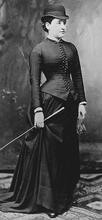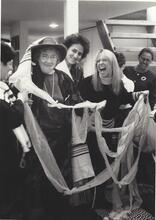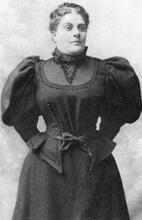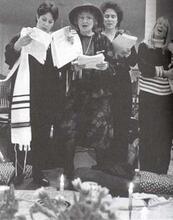Lauren Tuchman
Tuchman is the first blind woman ordained as a rabbi. Educated at Dickinson College and the Jewish Theological Seminary, she has pursued justice and inclusion work with Jewish communal organizations. Tuchman was ordained in 2018 by the Jewish Theological Seminary. After her ordination, she continued community organizing, including becoming the Washington, DC-based spiritual advisor for Avodah, a Jewish service organization. Although she draws on Hasidic sources for inspiration and often interacts with the Hasidic publishing world so that she can read Braille Jewish texts, she strongly identifies as a feminist and is proud of her leadership role as a woman rabbi. Tuchman’s teachings often focus on creating a positive theology around disability and inclusion.
Lauren Tuchman, the first blind woman ordained as a rabbi, is best known for her championing of inclusive Torah she-bi-khetav: Lit. "the written Torah." The Bible; the Pentateuch; Tanakh (the Pentateuch, Prophets and Hagiographia)Torah and disability justice. Though she is ordained in the Conservative movement, most of her work has been in community organizing and other non-congregational settings.
Family and Education
Born in 1986, Tuchman grew up in the Washington, DC, metro area. Her parents were an intermarried couple. Although she attended Jewish summer camp and sometimes identified with the Jewish characters in the novels her grandmother gave her, Judaism did not play a central role in her childhood home.
As a young adult, however, that began to change. Tuchman majored in religion at Dickinson College, where she became more connected to Judaism. She became involved in Hillel, and she sought to pair her academic interest in religion with more personal and communal involvement. She pursued a Master’s degree at the Jewish Theological Seminary in New York. Then, after some time away from academic work, she decided to pursue rabbinical school.
Becoming a Rabbi
As a rabbinical student, Tuchman found that both inside and outside of the classroom, she was animated by the question of how to make sustainable change in Jewish communities. She participated in a training class for New York-area clergy to learn community organizing at the Jewish Organizing Institute & Network (JOIN for Justice), served as the rabbinic intern at T'ruah: the Rabbinic Call for Human Rights, received a Jeremiah fellowship with Jews United for Justice, and completed her work in Clinical Pastoral Education at the New Jewish Home.
Because she was the first blind rabbinical student her professors and fellow students had worked with, Tuchman found herself calling attention to and challenging traditional readings of Jewish texts that marginalized people with disabilities. How should we understand texts that seem to treat sin as the cause of disability, or those that seem to exclude people with disabilities from God’s sanctuaries, such as Leviticus 21 which prohibits people who are “blind,” “lame,” or “crippled” from giving food offerings? Or Lit. "teaching," "study," or "learning." A compilation of the commentary and discussions of the amora'im on the Mishnah. When not specified, "Talmud" refers to the Babylonian Talmud.Talmudic texts that imply that Deaf people are also intellectually disabled and unable to communicate, and therefore not obligated in many commandments? Tuchman brought her own experiences to argue that the perspectives of people with disabilities could open new interpretive spaces for these texts.
Tuchman was ordained in 2018 by the Jewish Theological Seminary. After her ordination, she continued community organizing, including becoming the Washington, DC-based spiritual advisor for Avodah, a Jewish service organization. In September 2019, she joined the board of directors at JOIN for Justice.
From October 2018 to March 2020, Tuchman also learned with Rabbi David Jaffe’s Inside Out Wisdom and Action Project, which teaches spiritual practices to Jewish social change advocates. After finishing her training, she also began teaching with them.
Theology
“We Were All At Sinai: The Transformative Power of Inclusive Torah,” ELI Talk given by Rabbi Lauren Tuchman, the first blind woman ordained as a rabbi, December 7, 2017.
Inclusion forms a central piece of Tuchman’s public theology as well as her community organizing work. In 2017, her lecture “We All Stood At Sinai: The Transformative Power of Inclusive Torah” became a popular ELI talk (a Judaism-centered version of the TED Talk). In it she considers how people with disabilities, such as the blind Babylonian rabbis Rav Josef and Rav Sheshet, have been integral parts of Jewish tradition and subsequently how contemporary people with disabilities can see themselves at the center of Judaism today. In 2017, the Jewish Week named Tuchman one of its “36 under 36”—36 most influential people under the age of 36.
Although Tuchman often foregrounds inclusion with respect to ability status, she explicitly connects disability justice to other perspectives, such as feminism. Tuchman told The Jewish Week that true inclusion is “about whether a person feels truly welcome as their whole self in the community and, in a way, it’s almost like feminism.” She continued the comparison: “It’s one thing to include women rabbis… but another thing to change the culture to value women’s experiences. I want disability-informed perspectives on tradition to inform our understanding just as much as I want a feminist lens to do so” (The Jewish Week, 2017).
In her lectures and writing, Tuchman primarily focuses on creating a positive theology around disability and inclusion. Her theology is premised on the idea that neither the world nor religious tradition is perfect but humans can improve both, as she writes in a teaching on Amos, “I would hate for a world to exist in which the possibility for real, systematic, genuine change is removed because our hearts are too hard and too full” (State of Formation, 2015). Her teachings focus on creating a Judaism and a world that build relationships and value each person’s distinctive embodied experience.
A touchstone text for many of Tuchman’s teachings is Genesis 1:27, which proclaims that each human being is “created in the image of God.” She has explained her two-fold reading: “I interpret this to mean both that each and every one of us is inherently valuable and inherently valued, and secondly that being created in the image of God means that we are blessed to be partners with God in the daily renewal of creation” (State of Formation, 2016). That each individual is created in the image of God, she explains first, means that the blind woman or the gender non-binary person who uses a wheelchair is the image of God just as much as an able bodied man.
The second piece, humans’ participation in renewed creation, means that humans are called upon to remake the world for the better. The goal, Tuchman writes, is to “create a world that can truly be a dwelling place for the Divine Presence” (Noah, 5780). That means building a world of care and personal relationships. These relationships, she explains, are key to true inclusion, which is not about merely checking a diversity box or even enacting predetermined protocols of accommodation. Rather, they are about welcoming and making space for individual humans in their particularity.
In her teachings, Tuchman often engages Hasidic teachings, in particular those of Piaseczna Rebbe, Kalonymus Kalman Shapira. Shapira, often called the Warsaw Ghetto Rabbi, did not shy away from the topics of doubt or suffering. These are integral to human experiences, she holds. Acknowledging and sitting with one’s own suffering, as well as making space for others to do so, can create a deeper relationship with God—even if one’s emotions are anger and frustration.
In spite of the deep resonance of parts of her theology with Shapira’s, Tuchman has a more complex relationship with the contemporary Hasidic world. Because few Jewish presses produce books in Hebrew Braille, Tuchman has corresponded at length with each of them to procure books for herself and others. One of these presses is a Haredi (“ultra-orthodox”) press. She writes of her interactions with Haredi communities: “I felt in those moments a deep constriction, hiding myself, who I am and my own religious integrity, all for the benefit of access.” Because she needed access to texts, and because the Haredi community was producing these texts in Braille, she needed to pursue these relationships. And she recognized that they had much in common: they both sought to include blind Jews in Jewish practice, and in doing so, they both sought to bring the world closer to being a true dwelling place for the divine presence. But they had very different ideas about inclusion and Jewish observance with respect to gender, for example, which would have excluded her from the religious expertise, practice, and ordination that are central to her own life (“Organizing for Liberation,” 2019).
Tuchman holds that this theology, based on seeing each human as created in the image of God, should entail practical actions in the world. Inclusion within the Jewish community recurs as a primary goal. She notes that Jews who feel themselves on the margins of the tradition wonder, if “I don’t see myself reflected in the text, … Is this a Torah I too can take hold of?” (“We Were All at Sinai,” 2017). The Judaism she champions would represent each person in the text and its interpretation; her theology suggests it is just a matter of finding those voices and listening to them.
“Noah 5780,” Nov 1, 2019, https://rabbituchman.com/noach-5780/
“On Creating Holy Communities.” State of Formation, December 19, 2016. https://www.stateofformation.org/2016/12/on-creating-holy-communities/
“Organizing for Liberation.” Remarks for JOIN for Justice, October 3, 2019, https://rabbituchman.com/organizing-for-liberation-remarks/ )
“Parashat Kedoshim and the Admonitions of Amos.” State of Formation, April 29, 2015. https://www.stateofformation.org/2015/04/parashat-kedoshim-and-the-admonitions-of-amos/
“Thirty-Six under Thirty-Six.” The Jewish Week, June 2, 2017, p. 14.
“We Were All At Sinai: The Transformative Power of Inclusive Torah.” ELI Talk by Rabbi Lauren Tuchman, December 7, 2017. https://www.youtube.com/watch?time_continue=168&v=WOq77ouo5Og&feature=emb_logo













